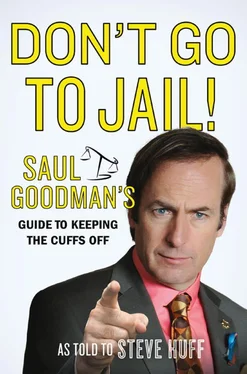If you’ve seen news stories about this, you know it happens to perfectly normal people all the time. What follows?
There is a whole menu of charges available to a hungry prosecutor presented with a wayward gun found by the TSA. One simple charge might be “concealing a weapon without a concealed carry permit.” That’s a few thousand in fines and maybe a year in jail. But wait, there’s more! There’s also the fact the weapon was carried into a known restricted area, and that’s an additional misdemeanor worth 180 days in lockup and a few more thousand dollars’ worth of “whoopsy.”
Worst-case? Ten years in jail and a $10,000 fine on a felony count of carrying a concealed weapon. Might as well be aware of just how deep that particular shithole goes.
What kind of case will your poor attorney face when he walks into court, full of youth and energy and ready to fight for justice? The prosecutor may be pushing to prove, above all else, that you really meant to do that. They’ll look for proof you tucked that gun away with some kind of ill intent. It’s not pretty, which is why you and your counsel need to convince the court there’s no way you’d intentionally do such a thing. It was early in the morning. It was really late at night, and you just wanted your nice socks.
There are, should you need to know them, perfectly legal ways to travel with your gun. They don’t involve acting like you thought it was socks. The TSA says, first of all, if you’re going somewhere that has regulations against carrying a firearm, don’t bring the damned thing along at all. The English, for example, won’t allow their rooty-tooty shooty cousins across the ocean to bring hot lead injectors onto their clammy soil.
If heading to a destination where people find it perfectly copacetic for you to have a little Winchester-provided protection, then simply declare every single bullet, pin, and barrel part of your equipment as you’re checking in, long before you reach the TSA. Make sure you’re a licensed owner when you do it.
There are clear guidelines for properly packing your piece on the TSA’s website, TSA.gov. Recap: learn how to pack your piece to avoid the police.
Other Peoples’ Guns
What if you get pulled over for a normal traffic infraction, maybe just ten miles over the speed limit, and—God forbid—you accidentally agree to a search? And then, even worse, what if that search turns up a firearm, and it’s not yours? This kind of thing happens all the time.
That whole “possession is nine-tenths of the law thing” sums it up nicely. If it’s in your possession, in your car, in your care, it don’t matter if you’re looking after the musket of Christopher Columbus himself—if it’s under your watch, you’d better be able to prove that Chris transferred the registration over to you.
If the gun is in your vehicle—or home, or locker at work, you get the picture—and some kind of police search determines it isn’t yours, well, it can get pretty hairy, pretty fast.
Hey, maybe you borrowed it! Or, more likely, it was given to you. Plenty of moms and dads bequeath all kinds of property to their beloved kids and grandkids in wills with little concern for whatever legal wrinkles arise. Say gramps left you his lucky Smith & Wesson .22. Its serial number was registered in his name. You—overcome with grief over losing your doting Pops—don’t bother to register said pistol with the authorities. Also, maybe work takes you through a bad part of town. So when you return, still sad but picking up the pieces after grampa’s funeral, you see that well-cared-for old gun and decide to give it a ridealong.
If that serial number comes up in a police database search, some suspicious parties may come to the conclusion that it’s been stolen. Now it’s time to ask the $64 question: did we know it was considered stolen?
Of course not, what a dumb question. That’s why it’s only worth $64. But it is the question that matters here. The law tends to believe if you know you’ve got some hot iron in hand, there was intent to reap some benefit for you, or for potentially anyone other than the actual owner of the weapon. Prosecutors will try a case if they think they can kick reasonable doubt right in the balls by proving these key things:
• The person with the gun in hand at the time of arrest knew in the moment that they had a stolen gat.
• That person was somehow going to benefit from the stolen property.Maybe by selling it and using the profits to buy a turntable for their scratch-happy cat, or selling it and funneling the money back to whomever took it in the first place.
So… your takeaway? It’ll serve you well (and you’ll be less likely to serve time) if you show the good folks of the court that you had no idea the gun in your possession would be considered stolen property. Because you didn’t. It’s important to remember, in this case, that you don’t know shit. Furthermore, you were doing what you were doing out of the goodness of your ever-good heart; there were no benefits to you from this property.
Speaking of stolen property, let’s move along to that sparkly shipment of gadgets that fell off a truck before a certain Good Samaritan (your friend, let’s say) did a respectable public service by selling the gadgets on the cheap last holiday season.
“Possession” can be like beauty: the definition’s in the eyes of the beholder. No matter the smart-sounding definition, possession has some big legal muscles with perpetual flex power. Read on to aim that flex power at your “friend’s” foes.
It’s Not Your Fault Your Friends Steal
We’ve all got that one friend. They just love playing the perennial Santa Claus, seeing their friends’ faces light up when they bring them the perfect book or record or carving knife set for no occasion at all. I had a pal, let’s call her Tiffany, who brought me a snazzy new tie every time we met up for a late-night Moscow Mule. Tiffany had impeccable taste, but this sugar-sweet gal had a serious problem. She was a grade-A fingersmith, and not the type you ask for at a full-service massage parlor. She lifted stuff. It started off as an altruistic little thrill to provide her hardworking friends and family with a little something extra just because, but then it spun off into a full-blown addiction. Sure, maybe some folks realize they can make a fair chunk of change from reselling their ill-gotten goods on eBay or Etsy or in the 7-Eleven parking lot or whatever, but most thieves—if they’re honest—get a real kick out of taking other peoples’ stuff. Who needs roller coasters when you’ve got the rush of sidling out of an electronics store, winking at the loss prevention goons so that they don’t notice the MP3 player tucked neatly inside your waistband? Long ago, when some drugstores stocked the skin mags right there with Field & Stream and not far from Today’s Bride, I knew of a guy who never once left a store of that type without his jacket stuffed with copies of Penthouse or Oui or—if he was moving too fast— Family Handyman . No one ever turned him in because he was always willing to share, and he was the only one on the block who knew how to replace the splash guard on a garbage disposal.
One thing some thieves learn early in their career is that their friends often make the best fences or provide the best storage facilities. This is how enabling your harmless shoplifter buddy can turn a good, mall-shopping, lotto-playing American like you into a criminal.
If this were a college course, I’d call it “Intro to Practical Consideration of Perspectives on Receiving Stolen Property.” I’d slot it at a convenient time, just after the cafeteria serves those fresh cinnamon buns, but not early enough to make you night owls compromise your beauty rest. I’d forego a final exam, pending student participation. I woulda made a helluva professor—motivation and enthusiasm and showmanship for days. But that’s another book entirely.
Читать дальше












